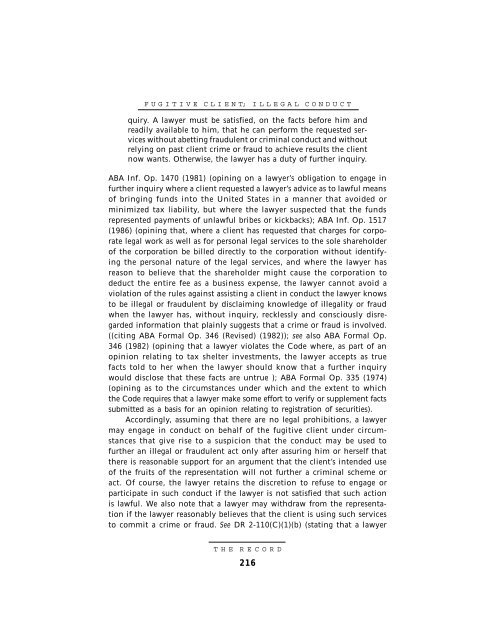THE RECORD - New York City Bar Association
THE RECORD - New York City Bar Association
THE RECORD - New York City Bar Association
Create successful ePaper yourself
Turn your PDF publications into a flip-book with our unique Google optimized e-Paper software.
F U G I T I V E C L I E N T; I L L E G A L C O N D U C T<br />
quiry. A lawyer must be satisfied, on the facts before him and<br />
readily available to him, that he can perform the requested services<br />
without abetting fraudulent or criminal conduct and without<br />
relying on past client crime or fraud to achieve results the client<br />
now wants. Otherwise, the lawyer has a duty of further inquiry.<br />
ABA Inf. Op. 1470 (1981) (opining on a lawyer’s obligation to engage in<br />
further inquiry where a client requested a lawyer’s advice as to lawful means<br />
of bringing funds into the United States in a manner that avoided or<br />
minimized tax liability, but where the lawyer suspected that the funds<br />
represented payments of unlawful bribes or kickbacks); ABA Inf. Op. 1517<br />
(1986) (opining that, where a client has requested that charges for corporate<br />
legal work as well as for personal legal services to the sole shareholder<br />
of the corporation be billed directly to the corporation without identifying<br />
the personal nature of the legal services, and where the lawyer has<br />
reason to believe that the shareholder might cause the corporation to<br />
deduct the entire fee as a business expense, the lawyer cannot avoid a<br />
violation of the rules against assisting a client in conduct the lawyer knows<br />
to be illegal or fraudulent by disclaiming knowledge of illegality or fraud<br />
when the lawyer has, without inquiry, recklessly and consciously disregarded<br />
information that plainly suggests that a crime or fraud is involved.<br />
((citing ABA Formal Op. 346 (Revised) (1982)); see also ABA Formal Op.<br />
346 (1982) (opining that a lawyer violates the Code where, as part of an<br />
opinion relating to tax shelter investments, the lawyer accepts as true<br />
facts told to her when the lawyer should know that a further inquiry<br />
would disclose that these facts are untrue ); ABA Formal Op. 335 (1974)<br />
(opining as to the circumstances under which and the extent to which<br />
the Code requires that a lawyer make some effort to verify or supplement facts<br />
submitted as a basis for an opinion relating to registration of securities).<br />
Accordingly, assuming that there are no legal prohibitions, a lawyer<br />
may engage in conduct on behalf of the fugitive client under circumstances<br />
that give rise to a suspicion that the conduct may be used to<br />
further an illegal or fraudulent act only after assuring him or herself that<br />
there is reasonable support for an argument that the client’s intended use<br />
of the fruits of the representation will not further a criminal scheme or<br />
act. Of course, the lawyer retains the discretion to refuse to engage or<br />
participate in such conduct if the lawyer is not satisfied that such action<br />
is lawful. We also note that a lawyer may withdraw from the representation<br />
if the lawyer reasonably believes that the client is using such services<br />
to commit a crime or fraud. See DR 2-110(C)(1)(b) (stating that a lawyer<br />
T H E R E C O R D<br />
216

















